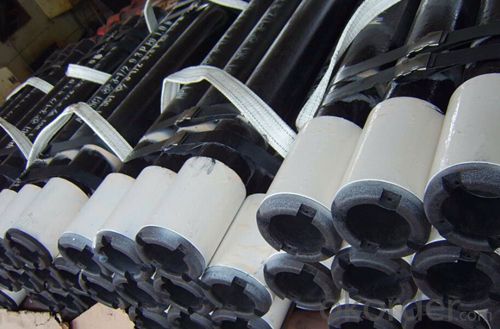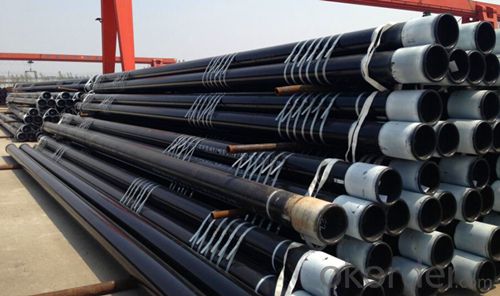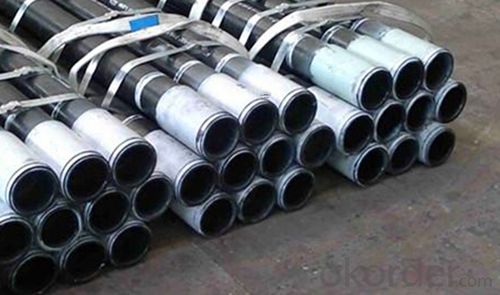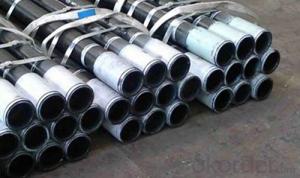Tubing Pipe of Grade P110 with API Standard
- Loading Port:
- Qingdao
- Payment Terms:
- TT OR LC
- Min Order Qty:
- 20 m.t.
- Supply Capability:
- 2000 m.t./month
OKorder Service Pledge
OKorder Financial Service
You Might Also Like
1. Structure of Tubing Pipe of Grade P110 Description
API 5CT Steel Pipe, P110 Oil/Petroleum tubing Pipe
1) Size: O.D. 1.900", 2-3/8", 2-7/8", 3-1/2", 4-1/2"
2) Grade: P110
3) Wall thickness: 3.18 - 10.54mm
4) Length: R1,R2,R3
5) Thread: 8RD and 10RD
6) All our Tubing accord with API SPEC 5CT standard.
2. Main Features of Tubing Pipe of Grade P110
1) Advanced test for quality
2) MTC, COC provided
3) Supervision is welcome
3. Tubing Pipe of Grade P110 Images



4. Tubing Pipe of Grade P110 Specification
Size Destination | Weight Destination | Outside Diameter | Wall Thickness | Type of End Finish | ||||||||
Grade | ||||||||||||
T&C Non-Upset | T&C External Upset | in | mm | in | mm | J55 K55 | L80 | N80 | C90 | T95 | P110 | |
1.900 | 2.40 | - | 1.900 | 48.26 | 0.125 | 3.18 | PI | - | - | - | - | - |
2.75 | 2.90 | 0.145 | 3.68 | PNUI | PNUI | PNUI | PNUI | PNUI | - | |||
3.65 | 3.73 | 0.200 | 5.08 | PU | PU | PU | PU | PU | PU | |||
4.42 | - | 0.250 | 6.35 | - | P | - | P | P | - | |||
5.15 | - | 0.300 | 7.62 | - | P | - | P | P | - | |||
2 3/8 | 4.00 | - | 2.375 | 60.3 | 0.167 | 4.24 | PN | PN | PN | PN | PN | - |
4.00 | 4.70 | 0.190 | 4.83 | PNU | PNU | PNU | PNU | PNU | PNU | |||
5.80 | 5.95 | 0.254 | 6.45 | - | PNU | PNU | PNU | PNU | PNU | |||
6.60 | - | 0.259 | 7.49 | P | P | P | P | P | - | |||
7.35 | 7.45 | 0.336 | 8.53 | PU | PU | PU | PU | PU | - | |||
2 7/8 | 6.40 | 6.50 | 2.875 | 73.02 | 0.217 | 5.51 | PNU | PNU | PNU | PNU | PNU | PNU |
7.80 | 7.90 | 0.276 | 7.01 | - | PNU | PNU | PNU | PNU | PNU | |||
8.60 | 8.70 | 0.308 | 7.82 | - | PNU | PNU | PNU | PNU | PNU | |||
9.35 | 9.45 | 0.340 | 8.64 | - | PU | - | PU | PU | - | |||
10.50 | - | 0.392 | 9.96 | - | P | - | P | P | - | |||
11.50 | - | 0.440 | 11.18 | - | P | - | P | P | - | |||
3 1/2 | 7.70 | - | 3.500 | 88.9 | 0.216 | 5.49 | PN | PN | PN | PN | PN | - |
9.20 | 9.30 | 0.254 | 6.45 | PUN | PUN | PUN | PNU | PNU | PUN | |||
10.20 | - | 0.289 | 7.34 | PN | PN | PN | PN | PN | - | |||
12.70 | 12.95 | 0.375 | 9.53 | - | PUN | PUN | PNU | PNU | PUN | |||
14.30 | - | 0.430 | 10.92 | - | P | - | P | P | - | |||
15.50 | - | 0.476 | 12.00 | - | P | - | P | P | - | |||
17.00 | - | 0.530 | 13.46 | - | P | - | P | P | - | |||
4 | 9.50 | - | 4.00 | 101.6 | 0.226 | 5.74 | PN | PN | PN | PN | PN | PN |
10.70 | 11.00 | 0.262 | 6.65 | PU | PU | PU | PU | PU | PU | |||
4 1/2 | 12.60 | 12.75 | 4.500 | 114.3 | 0.271 | 6.88 | PNU | PNU | PNU | PNU | PNU | - |
15.20 | - | 0.337 | 8.56 | - | P | - | P | P | - | |||
17.00 | - | 0.380 | 9.65 | - | P | - | P | P | - | |||
18.90 | - | 0.430 | 10.92 | - | P | - | P | P | - | |||
21.50 | - | 0.500 | 12.70 | - | P | - | P | P | - | |||
23.70 | - | 0.560 | 14.22 | - | P | - | P | P | - | |||
26.10 | - | 0.630 | 16.00 | - | P | - | P | P | - | |||
5. FAQ of Tubing Pipe of Grade P110
We have organized several common questions for our clients,may help you sincerely:
①How about your company?
One of the leading manufacturers and suppliers specializing in steel pipe products in China, mainly offering four series steel pipes including welded steel pipe (ERW, SSAW, LSAW and square and rectangle pipe), seamless steel pipe, hot dipped galvanized steel pipe and steel pipe with 3 layer polythene coating. We can provide customers different specification standards e.g. ASTM A53, ASTM A106, BS1387, API 5L, API 5CT, ISO3183 and etc. Our scope of supplying covers from 1/2" to 48" for the outside diameter of welded pipes, and 1/8" to 20" for the seamless pipes.
Other than steel pipes we are also capable of supplying a wide variety of pipeline accessories, steel pipe fittings; valves etc. consists of our one-stop sales. The integrated sales & service ensures customers with various demands an easier access for purchasing management.
②How to guarantee the quality of the products?
We have established the international advanced quality management system,every link from raw material to final product we have strict quality test;We resolutely put an end to unqualified products flowing into the market. At the same time, we will provide necessary follow-up service assurance.
③How long can we receive the product after purchase?
In the purchase of product within three working days, We will arrange the factory delivery as soon as possible.
- Q:What are the advantages of using steel pipes in the manufacturing of storage tanks?
- There are several advantages of using steel pipes in the manufacturing of storage tanks. Firstly, steel pipes are highly durable and have a longer lifespan compared to other materials, ensuring the longevity of the storage tank. Secondly, steel pipes have high strength and can withstand high pressure and extreme temperatures, making them suitable for storing a wide range of substances. Additionally, steel pipes are resistant to corrosion and can be coated to further enhance their protection against rust and other chemical reactions. Lastly, steel pipes are readily available and can be easily fabricated, making them a cost-effective choice for the manufacturing of storage tanks.
- Q:How do you calculate the thermal expansion of steel pipes?
- To calculate the thermal expansion of steel pipes, you need to know the coefficient of thermal expansion (CTE) of the specific type of steel used. This value represents how much the steel material expands or contracts per unit length with each degree of temperature change. Once you have the CTE, you can multiply it by the initial length of the steel pipe and the temperature change to determine the thermal expansion. The formula is: Thermal Expansion = CTE x Initial Length x Temperature Change.
- Q:How do you determine the pipe schedule for steel pipes?
- Several factors, including pressure rating, wall thickness, and outer diameter, are taken into account to determine the pipe schedule for steel pipes. The pipe schedule serves as a standardized system that classifies the thickness of pipe walls, ensuring compatibility and safety in various applications. To ascertain the pipe schedule for steel pipes, one must consider the maximum pressure the pipe will endure, typically measured in pounds per square inch (psi) or bars. The pressure rating indicates the pipe's ability to withstand pressure without experiencing failure or leakage. Higher pressure ratings necessitate thicker pipe walls. Another crucial factor in determining the pipe schedule is the wall thickness, typically expressed in inches or millimeters. The wall thickness directly correlates with the pressure rating, as thicker walls have the capacity to handle higher pressures. The American National Standards Institute (ANSI) has established a set of standardized wall thicknesses for steel pipes known as the "pipe schedule." The outer diameter of the pipe is also taken into consideration when determining the pipe schedule. The specific application and requirements influence the outer diameter variation. Selecting a pipe with the appropriate outer diameter is essential to ensure proper fit and compatibility with fittings, valves, and other components. In conclusion, the pipe schedule for steel pipes is determined by examining the maximum pressure, wall thickness, and outer diameter. By aligning these factors with the suitable pipe schedule, one can guarantee that the steel pipe is appropriate for its intended usage and capable of withstanding the required pressure.
- Q:How are steel pipes protected against electromagnetic interference?
- Steel pipes can be protected against electromagnetic interference by applying a layer of insulating material around the pipes or by utilizing electromagnetic shielding techniques such as wrapping the pipes with conductive materials. Additionally, grounding the pipes and implementing proper grounding practices can help minimize the impact of electromagnetic interference.
- Q:Can steel pipes be used for wastewater treatment?
- Yes, steel pipes can be used for wastewater treatment. Steel pipes are commonly used in the construction of wastewater treatment plants and systems due to their durability, strength, and resistance to corrosion. They are especially suitable for transporting and distributing wastewater, as they can withstand high pressure and temperature variations. Steel pipes can also be coated or lined with materials that provide additional protection against corrosion and chemical reactions with the wastewater. However, it is important to ensure that the steel pipes are properly maintained, inspected, and replaced when necessary to prevent any potential leaks or failures that could compromise the wastewater treatment process.
- Q:How are steel pipes used in the manufacturing of fire sprinkler systems?
- Steel pipes are commonly used in the manufacturing of fire sprinkler systems due to their durability and resistance to high temperatures. These pipes are used to transport water or other fire suppressants from the water supply to the sprinkler heads. The steel pipes are able to withstand the pressure and heat generated during a fire, ensuring a reliable and effective fire suppression system.
- Q:Are steel pipes suitable for transporting fluids?
- Yes, steel pipes are highly suitable for transporting fluids due to their durability, strength, and resistance to corrosion. They can safely and efficiently transport a wide range of fluids, including water, oil, gas, and chemicals, making them a popular choice in various industries such as oil and gas, water supply, and construction.
- Q:How to distinguish seamless pipe and welded pipe?
- The way to distinguish seamless pipes and welded pipes is to see if there is weld marks on the port.
- Q:Can steel pipes be used for conveying corrosive substances?
- Steel pipes can be used for conveying corrosive substances, but it is important to choose the right type of steel and consider additional protective measures. Stainless steel pipes, for example, are highly resistant to corrosion and can handle a wide range of corrosive substances. However, it is crucial to consider the specific corrosive properties of the substance being conveyed and the concentration levels. In some cases, additional protective coatings or linings may be necessary to prevent corrosion and ensure the longevity of the steel pipes. Regular maintenance and inspection are also essential to detect and address any signs of corrosion to prevent leaks or failures in the piping system. Overall, steel pipes can be used for conveying corrosive substances, but proper material selection, protective measures, and maintenance are vital to ensure safe and efficient operations.
- Q:Can steel pipes be used for oil and gas pipelines?
- Yes, steel pipes are commonly used for oil and gas pipelines due to their high strength, durability, and resistance to corrosion.
1. Manufacturer Overview |
|
|---|---|
| Location | |
| Year Established | |
| Annual Output Value | |
| Main Markets | |
| Company Certifications | |
2. Manufacturer Certificates |
|
|---|---|
| a) Certification Name | |
| Range | |
| Reference | |
| Validity Period | |
3. Manufacturer Capability |
|
|---|---|
| a)Trade Capacity | |
| Nearest Port | |
| Export Percentage | |
| No.of Employees in Trade Department | |
| Language Spoken: | |
| b)Factory Information | |
| Factory Size: | |
| No. of Production Lines | |
| Contract Manufacturing | |
| Product Price Range | |
Send your message to us
Tubing Pipe of Grade P110 with API Standard
- Loading Port:
- Qingdao
- Payment Terms:
- TT OR LC
- Min Order Qty:
- 20 m.t.
- Supply Capability:
- 2000 m.t./month
OKorder Service Pledge
OKorder Financial Service
Similar products
New products
Hot products
Related keywords






























